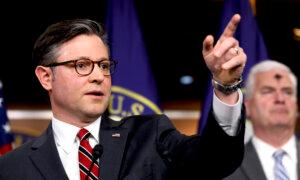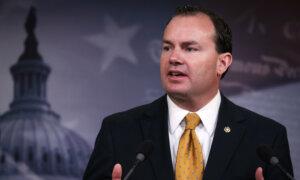The Senate has until the end of the day on March 8 to pass the legislation ahead of the shutdown deadline.
The U.S. Senate is meeting to pass a package of six government funding bills at the last minute Friday before a looming shutdown deadline on March 8.
Senators need to lock in a time to hold the important vote, which must be agreed upon by all 100 senators, and that vote is expected sometime Friday afternoon. The exact voting time will depend on the senators’ agreement on amendment votes.
If Democrats and Republicans get these bills passed, along with a second set of bills ahead of March 22, these efforts will get Congress one step closer to funding vital government programs for the remainder of the year.
The spending package, touted by both Republicans and Democrats, funds programs including the departments of Veterans Affairs, Energy, Agriculture, Transportation, Commerce, Justice, Interior, military construction, the Food and Drug Administration (FDA), Housing and Urban Development, and other federal programs.
House Bill
House Republicans under Speaker Mike Johnson’s (R-La.) leadership passed the House funding package on March 7 with bipartisan support from Democrats. The final vote was 339–85, which included two Democrats and 83 Republicans voting in opposition to the spending bills.
That 1,050-page package of bills from the House funds the same list of departments and government programs as the Senate version.
However, it also reduces funding for several programs, which Mr. Johnson referred to as “sharp cuts to agencies and programs critical to President Biden’s agenda” in a news release on March 3.
Those include 10 percent spending reductions for the Environmental Protection Agency, a 6 percent reduction for the FBI, and a 7 percent reduction for the Bureau of Alcohol, Tobacco, Firearms, and Explosives.
The bills also include provisions intended to restrain agencies the GOP claims are weaponized against Republicans.
“This legislation forbids the Department of Justice from targeting parents exercising their right to free speech before school boards, while it blocks the Biden administration from stripping Second Amendment rights from veterans,” Mr. Johnson said on March 3.
Since many Republicans wanted to do away with funding the government via large omnibus bills, the House Freedom Caucus pushed other GOP members to oppose the package.
“The House Freedom Caucus opposes the $1.65 trillion omnibus spending bill, which will be decided in two halves, the first being brought to the floor this week under suspension of the rules,” the group said in a March 5 statement.
“Even in the face of $34 trillion in national debt, the omnibus will bust the bipartisan spending caps signed into law less than a year ago and is loaded with hundreds of pages of earmarks worth billions.”
Despite the opposition from some Republicans, the passage of these funding bills marks a rare show of bipartisanship in Congress during a contentious primary and general election season.
Samantha Flom contributed to this report.
Original News Source Link – Epoch Times
Running For Office? Conservative Campaign Consulting – Election Day Strategies!


